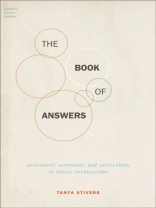Imagine for a moment the only way to confirm a yes-no question was by saying Yeah. How different would this make our communication? Relying on a large corpus of naturally occurring recordings of spontaneous social interaction, this book explores all of the ways that we confirm questions in our everyday social lives. Tanya Stivers analyzes what these different ways of responding allow us to do that is unique to each answer type. When do we answer with Yeah rather than He is, for instance; or when do we use more complicated forms of confirming? This information provides us with the basic response possibility space. From that point we can examine what the range of responses, in particular answers, tells us about what is important to us in managing social relationships through social interaction. The book explains that we can conceptualize the response possibility space as having three dimensions: alignment, autonomy, and affiliation. Speakers rely on the details of their response to position themselves at a particular point in that three-dimensional space, sometimes accepting trade-offs among the dimensions to achieve a stance that is higher in alignment and autonomy and lower in affiliation or higher in affiliation and autonomy but lower in alignment. The Book of Answers uses real-life conversations to find hidden patterns in how we do things together such as reach decisions, tell stories, or arrive at agreement or disagreement. Delving into the science of how we talk, this book investigates what those patterns tell us about human communication and our social lives.
Tanya Stivers
Book of Answers [EPUB ebook]
Alignment, Autonomy, and Affiliation in Social Interaction
Book of Answers [EPUB ebook]
Alignment, Autonomy, and Affiliation in Social Interaction
Dieses Ebook kaufen – und ein weitere GRATIS erhalten!
Sprache Englisch ● Format EPUB ● ISBN 9780197563915 ● Verlag Oxford University Press ● Erscheinungsjahr 2022 ● herunterladbar 3 mal ● Währung EUR ● ID 8368578 ● Kopierschutz Adobe DRM
erfordert DRM-fähige Lesetechnologie












